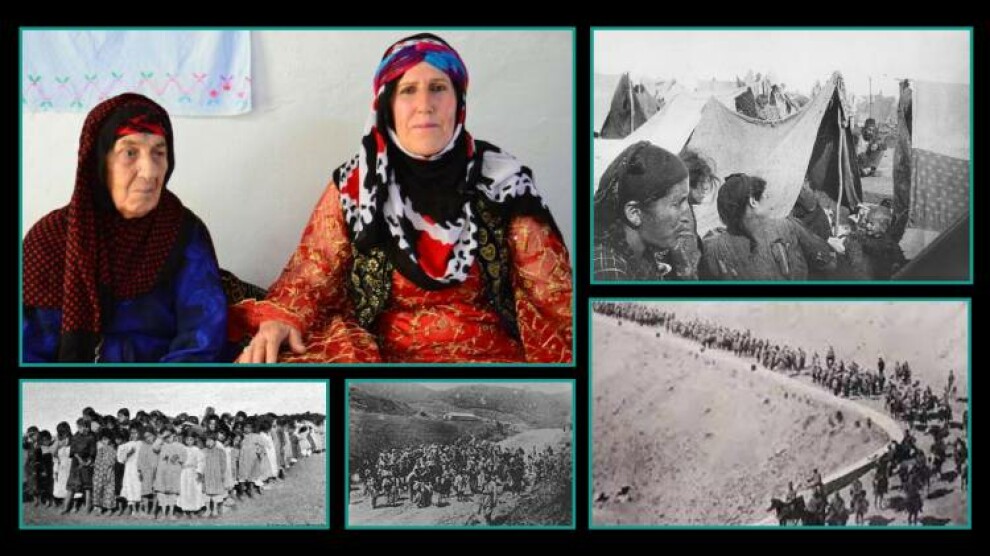She tells her children about genocide to not forget those days
106 years have passed since genocide was carried out against Armenians in 1915. Feride Sewme learned what had happened to the Armenian and Christians during the genocide from her parents and now she tells her children what their grandparents faced to “Not forget those days.” Feride Sewme also drew attention to the fact that the mentality has not changed since the Ottoman period.

ROJ HOZAN
Qamishlo – 106 years have passed since the Ottoman Empire carried out genocide against the Armenian and Christians. Between 800,000 and 1.8 million Armenians were killed when the massacres and deportations ended. Many Armenians were forcibly deported to Syria. Armenians escorted by the Ottoman soldiers were deprived of food and water during the deportation. They were subjected to robbery, rape, and massacres, according to the reports. Turkey hasn’t recognized the Armenian Genocide while 33 countries have formally recognized the Armenian genocide as of 2021.
They grew up listening to the stories about the genocide
Although many years have passed since the Armenian Genocide, Armenian children grew up listening to the stories of their parents and grandparents about the genocide. And now they tell these stories to their children. 85-year-old Feride Sewme, who lives in the Mashoqa village of Qamishlo’s Tirbesiye district, NE Syria, is one of them. She lost many relatives in the genocide. She spoke to NuJINHA about the genocide faced by her parents and relatives.
Her parents survived the genocide
Feride Sewme told us that she listened to very painful stories from her parents when she was a child. “We are Christians and my husband’s family is also an Armenian family. I wasn’t born yet in 1915 but I know what they faced from the stories. My parents and my husband’s parents experienced the Armenian genocide. My three uncles, their children, and two aunts were killed in the genocide. My father and his sister escaped the genocide. 50 members of my mother were killed in the genocide. My mother was saved by someone. My parents always told me what they had faced.”
Story of her parents…
Feride Sewme told us the story of her parents as follows: “My parents lived with their families in the Temereze village of Şırnak. This village was the village of Christians. My parents told me that people were killed by the sword and some were forcibly converted to Islam on that dark day. My parents fled to Syria and stayed with the families of Rojava. My mother told me how a pregnant woman had been killed in front of her and how people had been burned alive. My mother never forgot that day. My mother was a young woman and someone tried to keep her with them. But she fled to Syria with a family and then married my father. My father fled to Syria with my aunt.”
She tells the stories to her children
Feride Sewme’s parents didn’t convert to Islam, “However, my husband’s family was forcibly converted to Islam. We cannot blame them because we don’t know what they faced. My husband also lost many family members in the genocide. I feel the pain they faced. All those who told me the stories of the genocide died. But I tell these stories to my children. What happened during the genocide shouldn’t be forgotten.”
Feride Sewme mentioned the events that have happened since the Armenian Genocide, “The mentality of the Turkish state hasn’t changed since the Ottoman period. The Kurdish people have faced what the Armenians and Christians faced years ago. Kurdish people are friendly people. My parents escaped the genocide thanks to the Kurdish people. I respect the Kurdish people. I speak Kurdish now but this doesn’t mean that I have forgotten the Christian culture and language. I grew up with the Kurds and live with them now. When I heard the attacks of ISIS on Shengal, I remembered the stories of my parents. The mentality is the same, just its name changes.”
